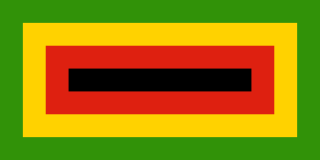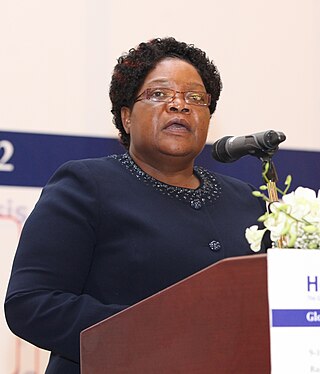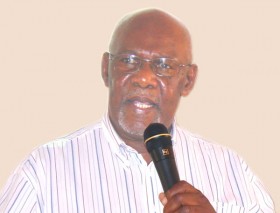Related Research Articles

The Zimbabwe Defence Forces (ZDF) are the military forces responsible for the defence of Zimbabwe against external threats from other countries,and also to suppress internal armed factions. It is composed of the Zimbabwe National Army (ZNA) and the Air Force of Zimbabwe (AFZ).. Since December 2017 the ZDF is headed by General Philip Valerio Sibanda.

The Zimbabwe African National Union –Patriotic Front (ZANU–PF) is a political organisation which has been the ruling party of Zimbabwe since independence in 1980. The party was led for many years by Robert Mugabe,first as prime minister with the Zimbabwe African National Union (ZANU) and then as president from 1987 after the merger with the Zimbabwe African People's Union (ZAPU) and retaining the name ZANU–PF,until 2017,when he was removed as leader.

The Zimbabwe African People's Union (ZAPU) is a Zimbabwean political party. It is a militant communist organization and political party that campaigned for majority rule in Rhodesia,from its founding in 1961 until 1980. In 1987,it merged with the Zimbabwe African National Union-Patriotic Front.

Joice Runaida Mujuru,also known by her nom-de-guerre Teurai Ropa Nhongo,is a Zimbabwean revolutionary and politician who served as Vice-President of Zimbabwe from 2004 to 2014. Previously she had served as a government minister. She also served as Vice-President of ZANU–PF. She was married to Solomon Mujuru until his death in 2011 and was long considered a potential successor to President Robert Mugabe,but in 2014 she was denounced for allegedly plotting against Mugabe. As a result of the accusations against her,Mujuru lost both her post as Vice-President and her position in the party leadership. She was expelled from the party a few months later,after which she formed the new Zimbabwe People First party.
Jonathan Nathaniel Mlevu Moyo is a Zimbabwean politician who served in the government of Zimbabwe as Minister of Higher Education from 2015 to 2017. He was previously Minister of Information and Publicity from 2000 to 2005 and again from 2013 to 2015. He was elected to the House of Assembly of Zimbabwe as an independent candidate in 2005 and 2008. He is considered the core architect of the AIPPA and POSA restrictive legislation.

Edgar Zivanai Tekere,nicknamed "2 Boy",was a Zimbabwean politician. He was the second and last Secretary General of the Zimbabwe African National Union (ZANU) who organised the party during the Lancaster House talks and served in government before his popularity as a potential rival to Robert Mugabe caused their estrangement.

Dumiso Dabengwa was a Zimbabwean politician. He served as the head of Zimbabwe People's Revolutionary Army (ZIPRA) intelligence during the Rhodesian Bush War.
Sydney Tigere Sekeramayi is a Zimbabwean politician who served in the government of Zimbabwe as Minister of Defence between 2013 and 2017. He has been a minister in the Cabinet since independence in 1980,serving as Minister of Defence from 2001 to 2009 and Minister of State Security from 2009 to 2013.
Patrick Antony Chinamasa is a Zimbabwean politician who served in the government of Zimbabwe as the minister of various cabinet ministries. Previously he served as the Minister of Finance and Investment Promotion and the Minister of Justice,Legal and Parliamentary Affairs.
Simbarashe Herbert Stanley Makoni is a Zimbabwean politician and was a candidate for the March 2008 presidential election against incumbent Robert Mugabe. He was Minister of Finance and Economic Development in President Robert Mugabe's cabinet from 2000 to 2002. He faced strong opposition during the Economic Change in Zimbabwe in the early 2000s as his policies contradicted those of the rest of the ZANU-PF party.
Obert Moses Mpofu is a Zimbabwean politician,who served as Minister of Home Affairs from 2017 to September 2018. Previously he was Minister of Macro-Economic Planning and Investment Promotion;Minister of Industry and International Trade;Minister of Mines and Mining Development;and Minister of Transport and Infrastructure Development. The Cabinet of Zimbabwe was later dissolved on 27 November 2017. He was reappointed as Minister of Home Affairs in Mnangagwa's first cabinet on 30 November 2017. The Culture portfolio was added to his ministry. Mpofu was later removed from the Zimbabwe cabinet in September 2018.
Joseph Chinotimba is a Zimbabwean political figure. He rose to prominence during the invasions of white-owned commercial farms that started after the 2000 constitutional referendum in Zimbabwe. He is widely regarded as a militant ZANU-PF cadre with unquestionable allegiance to the old guard of the ruling party. He is the national vice-chairman of the Zimbabwe National Liberation War Veterans Association.
John Landa Nkomo was a Zimbabwean politician who served as Vice-President of Zimbabwe from 2009 to 2013. After serving for years as a minister in the government of Zimbabwe,he was the Speaker of Parliament from 2005 to 2008. He was then appointed to the Senate in 2008 and was Minister of State in the President's Office in 2009. Nkomo was also a key figure in the Zimbabwe African National Union –Patriotic Front (ZANU–PF);he was National Chairman of ZANU–PF until December 2009,when he was elected as Vice President of ZANU–PF. As a consequence of his elevation to the party's vice presidency,he also became Vice President of Zimbabwe in December 2009.
Zimbabwe National Liberation War Veterans Association (ZNLWVA) is a Zimbabwean organisation established by former guerrillas of the Zimbabwe African National Liberation Army (ZANLA) and Zimbabwe People's Revolutionary Army (ZIPRA) who served during the Rhodesian Bush War. While not considered a state entity,the ZNLWVA is dependent on funding and support from Zimbabwe's ruling party,the Zimbabwe African National Union - Patriotic Front (ZANU-PF). In 2005,the government looked into ways to make members of the organisation part of the army of Zimbabwe.

In January,2008 the BBC reported that Simba Makoni might be nominated to run against Robert Mugabe in the Zimbabwean 2008 presidential election.
This article gives details about the vote counting system for the 2008 Zimbabwe presidential election

The Movement for Democratic Change (MDC) was a Zimbabwean political party organised under the leadership of Morgan Tsvangirai. The MDC was formed in 1999 as an opposition party to President Robert Mugabe's Zimbabwe African National Union –Patriotic Front (Zanu-PF). The MDC was made up of many civic groups who campaigned for the "No" vote in the 2000 constitutional referendum,which would limit a president's service to two terms,before the introduction of a prime minister,as well as giving legal immunities to the state.

The 7th Parliament of Zimbabwe was a meeting of the Zimbabwean Parliament,composed of the Senate and the House of Assembly. It met in Harare over five sessions from 25 August 2008 to 27 June 2013. Its membership was set by the disputed 2008 Zimbabwean general election,which resulted in a ZANU–PF majority in the Senate and Movement for Democratic Change –Tsvangirai control of the House of Assembly. Political negotiations resulted in the 2009 Government of National Unity,a coalition government composed of ZANU–PF,the MDC–T,and the MDC–M.

General elections were held in Zimbabwe on 29 March 2008 to elect the President and Parliament. Because of Zimbabwe's dire economic situation,the elections were expected to provide incumbent President Robert Mugabe with his toughest electoral challenge to date. Mugabe's opponents were critical of the handling of the electoral process,and the government was accused of planning to rig the election. Human Rights Watch said that the election was likely to be "deeply flawed." The elections were characterized by violence.

On 23 June 2018,a grenade exploded at White City Stadium in Bulawayo,Zimbabwe. The blast occurred at a ZANU–PF campaign rally,just after President Emmerson Mnangagwa had finished giving a speech. It was described as an assassination attempt against Mnangagwa,who was unharmed. The bombing resulted in at least 49 injured,including Vice-Presidents Constantino Chiwenga and Kembo Mohadi,and other high-ranking government officials. Two security agents later died of their injuries.
References
- ↑ "Harare a fitting tribute to Chombo's legacy". 19 April 2013.
- ↑ War vet threaten hostilities Archived 11 February 2008 at the Wayback Machine (accessed 02/11/2008)
- ↑ Jabulani Sibanda to be eliminated [ permanent dead link ](accessed 02/11/2008)
- ↑ Mugabe want Jabulani as chairman Archived 20 February 2008 at the Wayback Machine (accessed 02/11/2008)
- ↑ Hostilities Archived 11 February 2008 at the Wayback Machine (accessed 02/11/2008)
- ↑ Nehanda Radio
- ↑ "'We reject bedroom coup' Jabulani Sibanda". NewsDay. Zimbabwe. Retrieved 16 March 2016.